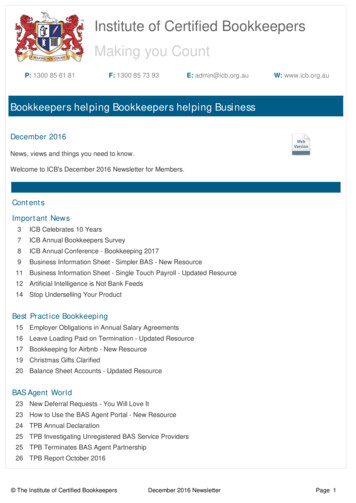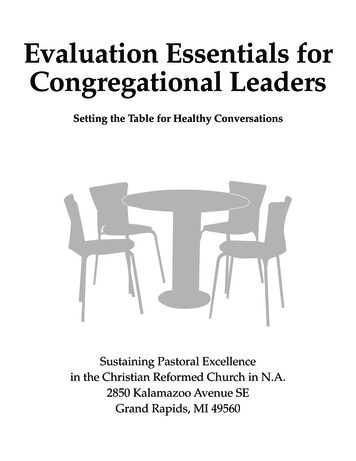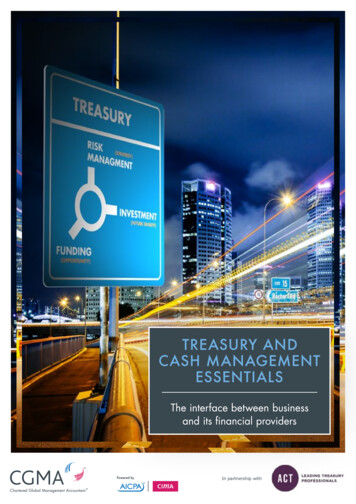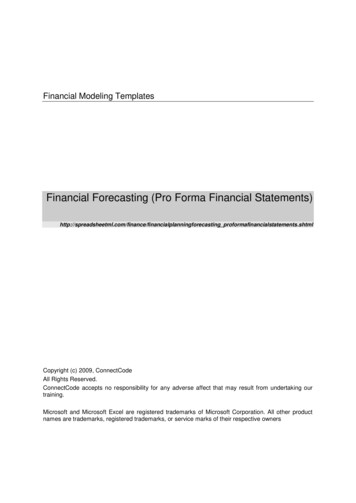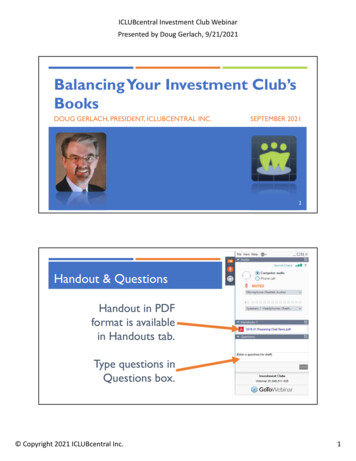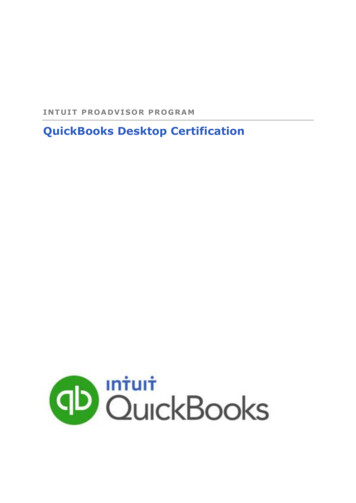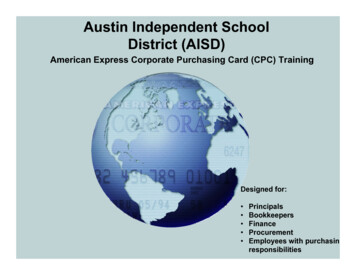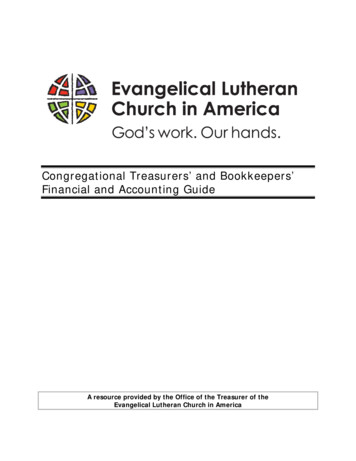
Transcription
Congregational Treasurers’ and Bookkeepers’Financial and Accounting GuideA resource provided by the Office of the Treasurer of theEvangelical Lutheran Church in America
PrefaceThese resources for congregational treasurers and bookkeepers have been developedin response to questions that the Office of the Treasurer is frequently asked. If you havesuggestions for additional information, please email: OTinfo@elca.org.This information is based on our best information at the time the guidelines wereprepared. Updated resources can be found on the “Finance for Congregations” sectionof the Office of the Treasurer website.www.ELCA.org/Resources/FinancialThe treasurer of the congregation has the responsibility to be aware of current taxreporting requirements for congregations. The ELCA strongly encouragescongregational treasurers to consult up-to-date resource material on tax requirementsand reporting. The ELCA also strongly encourages congregational treasurers to consultwith a tax preparer and attorney as necessary.
TTAABBLLEE OCOONNTTEENNTTSOFF CSRESPONSIBILITIES OF THE CONGREGATIONAL TREASURER1CONGREGATION BUSINESS ETHICS AND CONFLICT OF INTEREST POLICY2SEPARATION OF FINANCIAL RESPONSIBILITIES3EMPLOYEE DISHONESTY BOND3HANDLING CHURCH INCOME3SUGGESTED STEPS IN SAFEGUARDING OFFERINGS AND DEPOSITSSUGGESTED STEPS IN HANDLING EXPENDITURES56ACCOUNTABLE REIMBURSEMENT POLICIES7CONGREGATION CREDIT CARDSBEST PRACTICES FOR CONGREGATION/SYNOD CREDIT CARDSBANK RECONCILIATIONSRECORDKEEPING AND SUBSTANTIATION RULES OF THE IRSSUBSTANTIATION OF SINGLE CONTRIBUTIONS OF 250 OR MOREQUID PRO QUO CONTRIBUTIONS OF MORE THAN 75779101011SETTING FINANCIAL GOALS--THE BUDGET12BUDGET TYPESZERO-BASED BUDGETSAME AS LAST YEAR BUDGETUNIFIED BUDGETCAPITAL BUDGETPROGRAM BUDGETLINE-ITEM BUDGETDEBT RETIREMENT BUDGETTHE BUDGET PROCESSBUDGET CONTINGENCY PLANNING12121212121313131415THE ACCOUNTING SYSTEM16FUND ACCOUNTING SYSTEMSGENERAL OPERATING FUNDTEMPORARILY RESTRICTED FUNDSPROPERTY, PLANT AND EQUIPMENT FUNDSENDOWMENT FUNDSDESIGNATED FUNDSCREATING A CHART OF ACCOUNTS16171717171717
PETTY CASH ACCOUNTS19PETTY CASH CHECKING ACCOUNT20CHURCH EMPLOYMENT AND PAYROLL22ESTABLISHING THE EMPLOYER/EMPLOYEE RELATIONSHIPEMPLOYEES (OTHER THAN CLERGY)CLERGYSELF-EMPLOYED INDEPENDENT CONTRACTORSHOUSING ALLOWANCEWHO QUALIFIES FOR THE HOUSING ALLOWANCE?WHAT KIND OF EXPENSES CAN BE USED WHEN CALCULATING THE HOUSING ALLOWANCE EXCLUSION?HOW MUCH OF THE PASTOR’S SALARY CAN BE USED AS THE HOUSING EXCLUSION?HOW IS THE DIFFERENCE BETWEEN THE DESIGNATED HOUSING ALLOWANCE AND THE LOWER OF THETHREE AMOUNTS HANDLED?HOW IS THE HOUSING ALLOWANCE DECLARED?WHAT ABOUT THE PASTOR LIVING IN A PARSONAGE?WHAT IS A HOUSING EQUITY ALLOWANCE?HOW IS THE HOUSING ALLOWANCE HANDLED ON THE W-2?PAYROLL TAX OBLIGATIONSEMPLOYEE OUT-OF-POCKET EXPENSES222525262727272727282828282932BENEVOLENCE REMITTANCE TO SYNOD AND CHURCHWIDE33FISCAL YEARSTATEMENTSWHERE TO SENDUNDESIGNATED GIFTSRESTRICTED GIFTSUSING THE REMITTANCE FORM333333333334FINANCIAL REPORTING35BALANCE SHEETSTATEMENT OF REVENUE AND EXPENSESTATEMENT OF CASH FLOWMANAGEMENT REPORTS36373839AUDIT GUIDE40WHAT IS AN AUDIT?WHY HAVE AN AUDIT?THE ELCA RECOMMENDATION REGARDING AUDITS OF CONGREGATIONSTHE AUDIT COMMITTEEFUNCTIONS OF THE AUDIT COMMITTEECONDUCTING AN AUDIT404040404141
INSURANCE COVERAGE42REFERENCES42RESOURCES43
Congregational Treasurers and Bookkeepers Financial and Accounting GuideA resource provided by the Office of the Treasurer of the Evangelical Lutheran Church in AmericaResponsibilities of the congregational treasurerThe responsibilities of the treasurer of a congregation are usually stated in the bylaws ofthe congregation; these responsibilities include but are not limited to the following: Serving as financial officer of the congregationBeing responsible for payment of all bills, invoices and chargesPerforming or overseeing all of the bookkeeping functionsPreparing the monthly (or quarterly) financial reports for the congregation councilFiling all of the required federal and state tax formsMonitoring the cash position of the congregation and investing available funds asdirectedBorrowing funds as directed by the congregation councilProviding the congregation with any requested financial informationAssisting in the preparation of the annual budget for the congregation councilThese guidelines are presented to clarify the role of the congregational treasurer andhelp establish accounting procedures that will meet the financial objectives of acongregation. Please refer to the additional reference material provided as needed.Once accounting procedures for the congregation are established, they should bedocumented for reference purposes. This process is both for the benefit of the Office ofthe Treasurer and for the protection of the congregation.PAGE 1 OF 43Document Last Updated: May 5, 2017The latest version of this document can be found at:www.elca.org/Resources/Financial
Congregational Treasurers and Bookkeepers Financial and Accounting GuideA resource provided by the Office of the Treasurer of the Evangelical Lutheran Church in AmericaCongregation business ethics and conflict of interest policyBest practices for all organizations, including nonprofits and churches, recommend thata business ethics and conflict-of-interest policy be in place. A model CongregationOperational Ethics Policy has been developed by the churchwide office. ELCAcongregations are encouraged to review this model and work to adapt this form orcreate their own policy.Some explanationsEthics policies are designed to help people understand fiduciary duties and addressconflicts of interest or appearance of conflicts. For example, there is a conflict of interestthat needs to be examined if the congregation president is the head of the constructioncompany that is bidding to build the new addition to the sanctuary. Likewise, if thecongregation is considering hiring a choir director who is the niece of the associatepastor, this needs to be carefully handled.This policy contemplates coverage for all congregation officers, congregation councilmembers, congregation committee members, and congregation staff. In someorganizations, there are separate policies for staff. This policy is a combined policydesigned to cover directors, committee members and employees.You will note that we have called it an “operational” ethics policy. The reason for thisname is to be clear that the ELCA has many ethical concerns that are certainly notcovered in this short policy. This policy is to address the business side of yourcongregation and its role as a nonprofit corporation.Some ethics policies require that all those who are covered sign the policy at inceptionand then re-sign on a regular basis. There is no such requirement in the draft, but youmay choose to require it. In any event, it is very important that all staff and directors beprovided a copy when it is adopted and a protocol should be in place to provide a copyto all new individuals.It is important to consult with your legal and financial advisors when adopting a businessethics policy.PAGE 2 OF 43Document Last Updated: May 5, 2017The latest version of this document can be found at:www.elca.org/Resources/Financial
Congregational Treasurers and Bookkeepers Financial and Accounting GuideA resource provided by the Office of the Treasurer of the Evangelical Lutheran Church in AmericaSeparation of financial responsibilitiesThere should be clear separation of duties between those responsible for handling andrecording the income of the congregation and those responsible for handling thedisbursements of the congregation. A strong system of internal controls safeguards theassets of the congregation and protects the character of the individuals handling cash orwriting checks. The congregation should operate under the same standards andsafeguards as a good business operation. This includes written policies and proceduresfor key responsibilities.In the congregational setting, a climate of personal trust is usually assumed. This ishealthy and proper. The following suggestions should not be interpreted as a lack oftrust in the financial officers of a congregation. Rather, they offer protection for theirreputation. No person should be placed in a position where any suggestion ofmishandling of funds must be defended by the word of one person against that ofanother. This system is intended to provide verification and support of sound practicesat every step. Prudent and consistent practices in handling money help maintain aclimate of trust and help safeguard church assets.The same concepts apply to congregational auxiliaries and organizations. Thecongregation council is constitutionally responsible for the financial and property mattersof the congregation (C12.05).Cash transactions should be handled at all times in dual custody. The followingfunctions should be the responsibility of someone other than the treasurer, such as afinancial secretary or the stewardship committee: Oversee the counting of offeringsOversee depositing of receiptsTrain individuals involved in counting the offeringsReport to the treasurer the total offerings each week and any special-purposebreakdownsOversee recording of contributions to the individual contribution recordsReport on levels of giving to the church council and congregationProvide periodic and annual statements to the contributors for tax reportingEmployee dishonesty bondAll individuals elected or appointed to handle money in the congregation and itsauxiliaries should be covered under an employee dishonesty blanket bond. Furtherinformation on employee dishonest blanket bonds can be provided by the ELCAEndorsed Property and Liability Insurance Program.Handling congregational incomeNormal handling of funds in the congregation involves several steps. Some generalprinciples:PAGE 3 OF 43Document Last Updated: May 5, 2017The latest version of this document can be found at:www.elca.org/Resources/Financial
Congregational Treasurers and Bookkeepers Financial and Accounting GuideA resource provided by the Office of the Treasurer of the Evangelical Lutheran Church in America1. No individual should be required or allowed to handle the congregation's incomealone at any time.2. It is preferred that no cash be stored in the church.3. Several people should be involved on a rotating basis in handling income.4. All income transactions (receipts and disbursements) should be properlyrecorded and verifiable.5. It is understood that the recording of income or gifts from individuals of thecongregation is a confidential matter and such records are only available to thepastor, financial secretary and the stewardship committee, when required.6. The pastor should not serve in the position of treasurer and should not havecheck-signing authority over any church account.7. It is preferable for all funds under the direction of the congregational council to bein a single checking account and investment program. Congregational auxiliariesand organizations may wish to be included in this system, authorizingdisbursement of funds through the congregational treasurer with vouchers forpayment.8. Financial reports to the council and the congregation should include all funds,accounts and investments of the congregation and its auxiliaries andorganizations. No information should be withheld. These should be reviewed andreported on a consistent basis.PAGE 4 OF 43Document Last Updated: May 5, 2017The latest version of this document can be found at:www.elca.org/Resources/Financial
Congregational Treasurers and Bookkeepers Financial and Accounting GuideA resource provided by the Office of the Treasurer of the Evangelical Lutheran Church in AmericaSuggested steps in safeguarding offerings and deposits1. Immediately following the service, two people carry the contents of the offeringplates to a secure room for counting or placing in an adequate safe for countingthe following day. Church funds or offerings should never be taken to a privateresidence for counting.2. The envelopes are immediately opened by at least two people. Envelopes aremarked as to intent and purpose if for other than undesignated offerings.3. Balances between envelope totals and cash and check totals are reconciled.4. A summary report outlining the various accounts income is to be credited to mustbe prepared and initialed by at least two people.5. A deposit slip is prepared and the deposit taken to the bank promptly.6. Copies of the deposit slip and the summary report are given to the treasurer andto the financial secretary.7. Individuals responsible for handling offerings and deposits should be rotatedperiodically. It is best if the treasurer and the financial secretary are notpersonally involved in the process.8. The term of office served by the treasurer should be limited to a specific period oftime. The successor to the treasurer should not be from individuals of the samefamily nor should this office be rotated between the same individuals serving asfinancial secretary and treasurer.9. There should be clear segregation of duties and the people involved in handlingincome should not be involved in handling of expenditures.10. Funds collected from other activities (fundraisers, special events, etc.) should bedirected to those responsible for recording and making bank deposits of thesefunds. Copies of the deposit slip and summary report are given to the treasurerand financial secretary.11. Members should be encouraged to make their offering by check or electronicpayments, not cash.12. Congregations should send out quarterly giving reports.PAGE 5 OF 43Document Last Updated: May 5, 2017The latest version of this document can be found at:www.elca.org/Resources/Financial
Congregational Treasurers and Bookkeepers Financial and Accounting GuideA resource provided by the Office of the Treasurer of the Evangelical Lutheran Church in AmericaSuggested steps in handling expenditures1. Congregations should have documented policies and procedures in place forhandling expenditures. This should include what constitutes appropriate businessexpense, supporting documentation and approval levels for various transactions.2. Bills and obligations should be approved for payment by an authorized signatory.This approval should be indicated in writing by the person responsible. In largercongregations, a purchase or approval form may be used to approve paymentsand identify the accounts to be charged. Expenditures should be supported byoriginal invoices or receipts, not photocopies, whenever possible. In cases ofACH transfers, all support provided to the Congregation by the bank should bemaintained.3. Check is prepared by someone other than the person approving the expenditure.4. Check is signed by individuals authorized under the bank account agreement.Dual signatures are recommended. The pastor should not be an authorizedsigner.5. Blank checks should never be signed in advance under any circumstance.6. Check number is written on invoice or support document to prevent duplicatepayment, and check should be mailed directly to the vendor by the accountspayable staff.7. At least three individuals should be involved in the above four steps.8. Savings and investment accounts – if the financial secretary and/or treasurer isauthorized to initiate fund transfers to or from these accounts via telephone, it issuggested that a verification notice (written form) be developed indicating that ona specific date such transfer took place (and for what purpose) and signed by thepresident of the congregation. This form is to be retained in the files of theseaccounts.9. Individuals independent of the process should be responsible for reconciling thesavings and investment accounts.PAGE 6 OF 43Document Last Updated: May 5, 2017The latest version of this document can be found at:www.elca.org/Resources/Financial
Congregational Treasurers and Bookkeepers Financial and Accounting GuideA resource provided by the Office of the Treasurer of the Evangelical Lutheran Church in AmericaAccountable reimbursement policiesFor business and tax reasons, it is usually in the best interest of the congregation andits staff to have an accountable reimbursement policy. Accountable reimbursementpolicies are simply a method for reimbursing business expenses on an actual-cost basisrather than providing an expense allowance.Establishing an accountable reimbursement policy is simple: a congregation first sets upa budget for the pastor’s professional and business expenses, such as travel,continuing education, subscriptions, etc. When the pastor incurs a ministry-relatedexpense, s/he submits a reimbursement claim with appropriate documentation. Or,instead of paying the expense directly, the pastor can request the congregation to makethe payment.The IRS requires adequate accounting by the employee and maintenance of theappropriate supporting documentation by the employer. The IRS requires actualreceipts for any expense over 75.00. The congregation may use this figure or set alower limit. (e.g., ABC Lutheran Church requires receipts for all expenses over 25.00.)The documentation should indicate (or be listed on the receipt itself): the purchase,amount, date, place and the business nature of the expense.We have provided a number of different resources to help congregations understandand establish an accountable reimbursement policy. They may be found at:www.ELCA.org/Resources/Financial.Congregation credit cardsBest practices for congregation or synod credit cardsPayments made by credit cards are subject to the same best practices, legal and IRSregulations as any other payments and proper authorization, approval andrecordkeeping are essential. Here are best practices for establishing a general chargeaccount for your organization:1. Determine whether a credit card is needed.Evaluate the need for a credit card. While some online and telephone transactions canonly be processed using a credit card, a prompt expense reimbursement system couldprocess reimbursements for expenses charged to personal cards before the end of thebilling cycle. For sake of convenience congregations may find credit cards a good optionfor necessary expenses. However, on credit cards, the payment obligation occurs at thetime the card is used. This makes it different from payment by check, in which case theexpense is reviewed and approved according to policy before payment is issued. So,the organization should identify ahead of time what transactions will be charged.2. Determine who will have custody of the card and be responsible for accountingfor all charges.The custodian of the credit card is not necessarily the same person responsible foraccounting and reconciling all the charges. Card issuers will require the name andPAGE 7 OF 43Document Last Updated: May 5, 2017The latest version of this document can be found at:www.elca.org/Resources/Financial
Congregational Treasurers and Bookkeepers Financial and Accounting GuideA resource provided by the Office of the Treasurer of the Evangelical Lutheran Church in Americapersonal identification information for the responsible individual, even on a companycard. All credit card statements should be reconciled by another responsible person,other than the card holder, in order to prevent fraud.3. Establish a published policy for use of the card that covers:1. Who will have custody of the card (and statements) and how will those be keptsecure.2. What charges may be made.3. Who may make the charges. This generally should be employees or officers.4. Who approves the charges and when.5. Who is the contact with the card issuer for disputes, problems, etc.6. How the charges will be documented, reconciled and securely filed.7. How the credit card bills will be paid?8. Avoiding sales tax charges, if the congregation is exempt under state law.9. Prohibiting personal (non-business) charges.10. Setting card limits
May 05, 2017 · etty cash checking account 20 church employment and payroll 22 establishing the employer/employee relationship 22 employees (other than clergy) 25 clergy 25 self-employed independent contractors 26 housing allowance 27 who qualifies for the housing allowance?27 what kind of expenses can be used when calculating the housing allowance exclusion?27 how much of the
